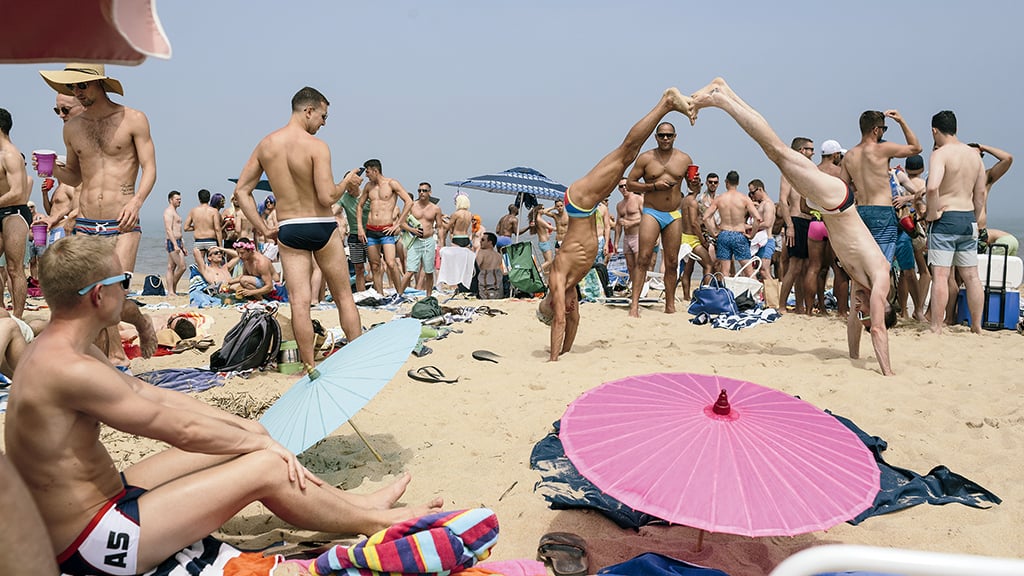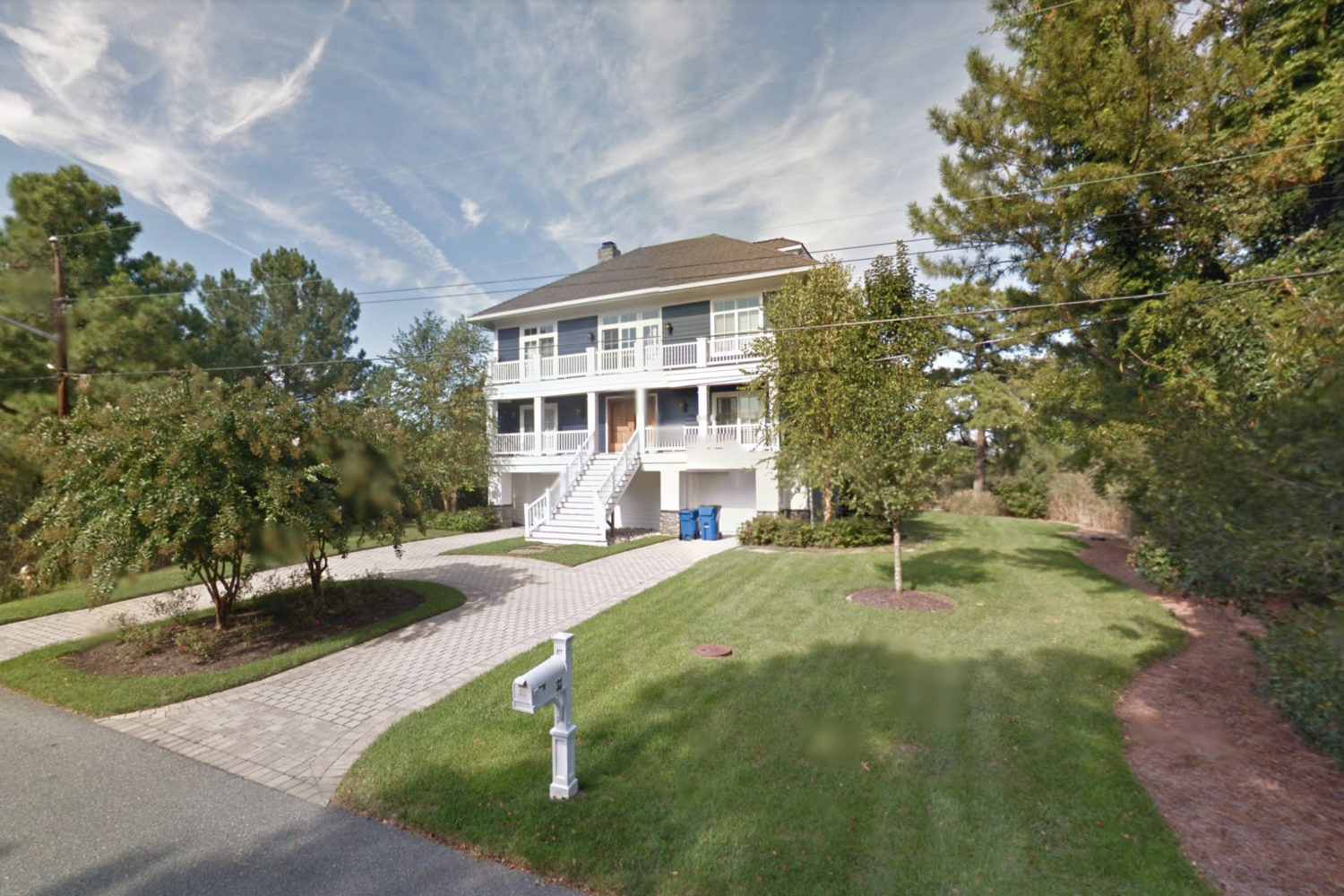In the weeks before the rally, Kelley Gillespie threw herself into its organization with the savvy of the seasoned planner of Washington events that she is.
She and her team plotted out what props would make for the most provocative TV clips. They ordered T-shirts—an eye-catching chili-pepper red—and cooked up a social-media campaign. On June 16 last year, Gillespie posted a photo of her sons staring seriously into the camera in the manner of Michelle Obama with her “Bring Back Our Girls” placard, but with a communiqué that was rather less serious.
“REHOBOTH,” one of the signs read, “where it’s a CRIME to be a KID.”
With that, the Great Rehoboth Pool Battle was on.
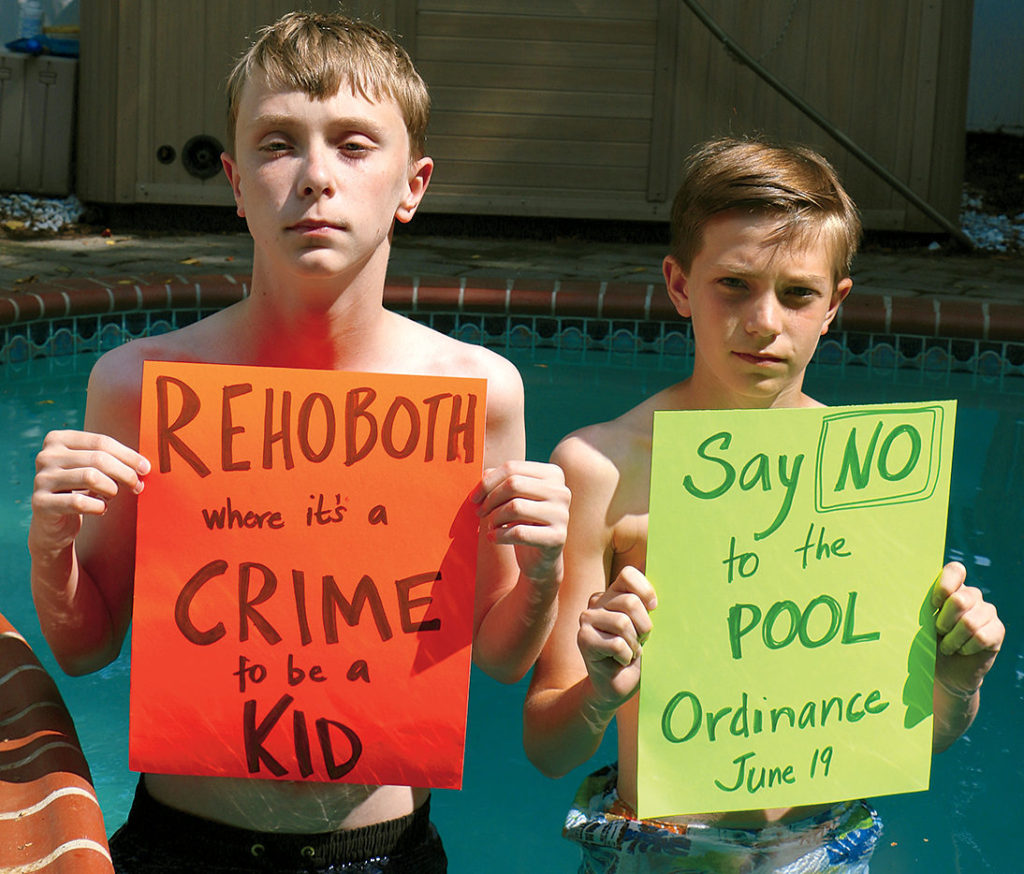
It all started with the sort of mundane ordinance proposal that might normally slip past most of Rehoboth’s 1,400 year-round residents, not to mention its 150,000 weekenders. But in this case, it became something impossible to ignore: Under the bill, people who rented houses with pools wouldn’t be allowed to swim in those pools.
As in, owners renting their homes to vacationers would have to politely, awkwardly explain that—not to worry!—they could use the nearby beach all they wanted, just not the pool out back, because, unfortunately, due to a spat with the mayor, sigh, it would have to be closed and covered all week.
As in, city dwellers who’d waited all year for their weeklong summer rental at the shore could frolic in Rehoboth’s two-foot waves, but there would be no lazy swims after dinner or morning laps at home. They could stare at the pool through the beach-house windows, but there’d be no swimming. Period.
It was an unprecedentedly draconian proposal in one of the East Coast’s most beautiful resort towns. Lines in the sand were quickly drawn.
On one side: the summer crowd and owners of pools, many of them Washington types who shelled out for these amenities precisely because they help make a property appealing to renters in a town where a nice house can fetch $10,000 a week in-season.
On the other: long-term mayor Sam Cooper and a bevy of year-round residents—including more than a few former Washingtonians—who are deeply concerned about what a spate of McMansions is doing to Rehoboth.
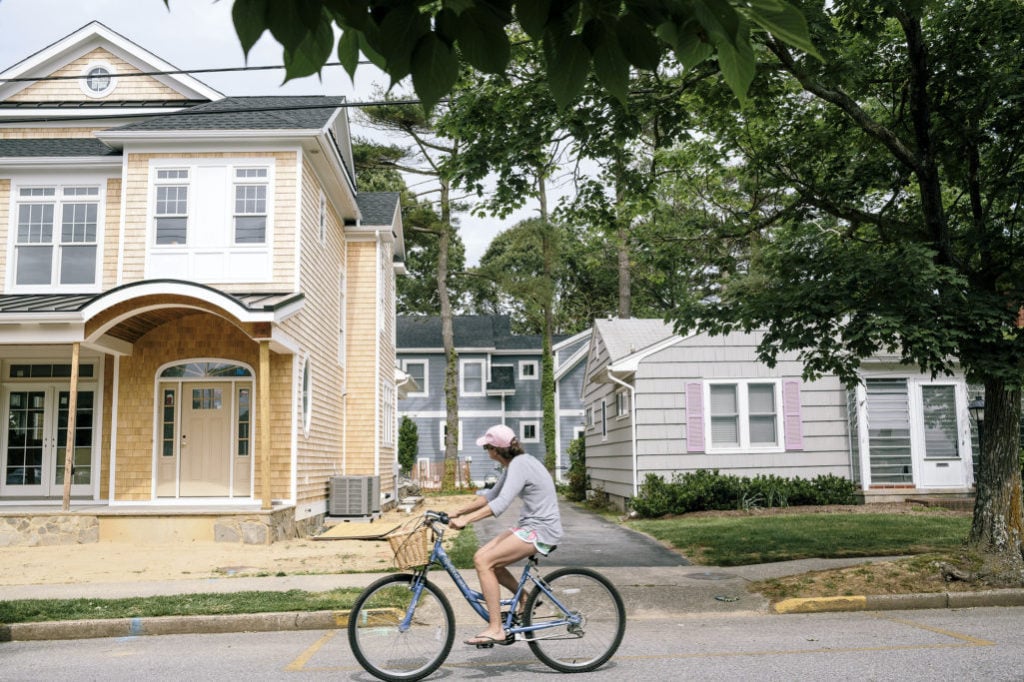

Gillespie was in the former camp, whose partisans saw the measure as an apocalyptic assault on their constitutional rights. On the day of the vote, she and her allies—including a former congressman—rallied under the name Save Our Nation’s Summer Capital. They showed up in those red T-shirts and mugged for the cameras.
“No one had seen that in Rehoboth before,” full-time resident Donna Mabry says.
Not that the anti-pool camp couldn’t hold their own in the rhetorical-fury department. Even Gillespie’s T-shirts became fair game. “Careful, compadres,” one critic wrote to a local paper, “this is the uniform of the international communist movement.”
From there—and on this point no one disagrees—Rehoboth Beach lived out one of its ugliest years in recent memory. Friendships frayed. Allegations flew, everything from homophobia to un-Americanism to far more obscure charges such as “Swift-Boat Realtors.” Lawsuits piled up like matchbooks at a boardwalk dive bar.
By the time the crowds headed home for the winter, the Great Rehoboth Pool Battle had begun to seem less like a scrum about local land-use policies and more like a battle for the soul of Rehoboth itself.
How did things get so very bad in Washington’s favorite place to summer?
• • •
Rehoboth was founded in 1873 as a camp meeting site for Methodists.
But it didn’t take long before it was home to battles over its own identity. At first, it was the Methodists against a new class of pleasure seekers who came via neighboring Lewes, lured by the sea.
In the 1930s, Washington’s gay elite began vacationing in Rehoboth, and over the years the town became the place where those who were not out in DC could relax and even mingle comfortably across the aisle. “One of the first people I met was [closeted Dwight Eisenhower adviser] Bob Gray,” says Steve Elkins, founder of CAMP Rehoboth, an LGBT advocacy and community-service group. “He had this giant house with a pool.”

Beginning in the early ’80s, the influx of gay visitors became yet another cause of angst about newcomers. In 1981, when the Blue Moon became one of Rehoboth’s first openly gay-friendly restaurants, local teenagers chucked tomatoes, beer cans, and fireworks at the windows. Several years later, after the owners opened a dance hall called the Strand, many year-round residents were appalled. “Keep Rehoboth a Family Town” began popping up on bumper stickers. The town repeatedly blocked the Strand’s liquor license, until it closed.
By this point, Rehoboth was accustomed to using regulatory arcana as a way of fighting people who challenge what city leaders view as the town’s native character. In 1920, four commissioners schemed to subdivide some of the town’s green space for development—until the mayor held a vote to smack them down. In the ’70s, the city halved the height limit on oceanfront high-rises after a developer built the Lego-like Star of the Sea condo on the boardwalk; non-single-family houses were considered vaguely foreign. The brawl of the early ’00s was over FAR—or floor-area ratio, a calculation of the maximum amount of interior square footage your property can contain. It ended with major new zoning restrictions: McMansion owners were foreign, too.
In some ways, Rehoboth’s contretemps replicate those in the Hamptons or on Cape Cod or anywhere property values are absurdly high and beautiful land is absurdly scarce, where locals battle vacationers and where haves battle have mores. But the Great Rehoboth Pool Battle also featured some unusual aspects that say a lot about both the Delaware shore and the capital city whose residents drive there on summer weekends.
For one thing, Delaware—with its low property taxes—is a nice place to own land. “I sometimes list properties where the trash bill [$275 annually per household] is higher than the tax bill,” says real-estate agent Randy Mason. This and Rehoboth’s proximity to the ocean helped make its market much more stable than that of other resort towns over the past decade. Mason says the “vast majority” of houses now go for more than $1 million.
No wonder the town has drawn investors from up and down the East Coast, who can count on an ample supply of short-term renters—many of them from Washington, a city comparatively unscathed by the recession that battered other locales. And nowadays, the renters aren’t just the same families year after year, as in the more laid-back ’80s. Thanks to innovations such as Airbnb, there’s a bigger, more random array of people able to shell out for a rental.
But to really capitalize on your investment, you need to rent those discerning tenants something nicer than a little beach bungalow. Rehoboth’s mid-20th-century cottages are exactly the wrong age: old enough to be clunky and energy-inefficient, not old enough to be charming in the way of the Victorians in neighboring Lewes. Much better to tear them down and start over.
That’s where the trouble starts. Rehoboth is small and dense, just one square mile wedged against the ocean. Most lots measure 50 by 100 feet. The prices might suggest an elite destination, but the layout still says middle-class summer vacation. Thus a large house next door can dominate every aspect of your life: light, sound, parking, tree canopy, and the hard-to-define but nonetheless crucial categories of personal comfort (do you like your neighbors?) and aesthetics (do you hate what you see out the kitchen window every morning?).
In the Hamptons, development fights often involve Wall Street titans using Wall Street tactics. Not so in Rehoboth. Many of its residents, full-timers and summer people, are from Washington—professional (or retired) partisans. When it came to last year’s brouhaha, a lot of those involved were endowed with some particular and practiced talents—and they definitely did not leave those behind when they crossed the Bay Bridge.
• • •
Donna Mabry and her husband, both retired clinical psychologists, have spent time in Rehoboth for 20 years, the last ten as full-time residents.
“We’re still considered sort of newcomers,” she says. About two years ago, an investor demolished the property behind them and built a seven-bedroom with a pool that was rented out to up to 18 people most weeks during the summer and several other months of the year.
“As soon as they opened the house, there was this screaming and shrieking going on in the pool,” Mabry says. It lasted into the night. “People minimize and pooh-pooh noise,” she adds. “Until it happens to you.”

Mabry held a meeting and discovered many were similarly aggrieved. The meeting brought up other complaints about “mini-hotels,” the local slur for six-plus-bedroom houses built specifically as rentals.
It’s worth noting that a lot of the people most freaked out by party houses full of weekending Washingtonians are themselves Washingtonians—it’s just that they happen to be Washingtonians who saw a different sort of idyll in Rehoboth.
“You can sit on your porch at night and hear crickets and be two blocks from the beach,” says Donald Myers, a retired DC pension lawyer who now lives in Rehoboth. He says that commercializing its residential neighborhoods is a threat to the city’s architecture, its trees (something many beach towns don’t have), and even its tourist economy.
“It’s a very different town if all the trees go,” says Frank Cooper, who used to run an IT company in Washington and moved to Rehoboth in 2007. “This turns it into Ocean City, the dreaded Ocean City—if there’s anything we can agree we don’t want it to be!”
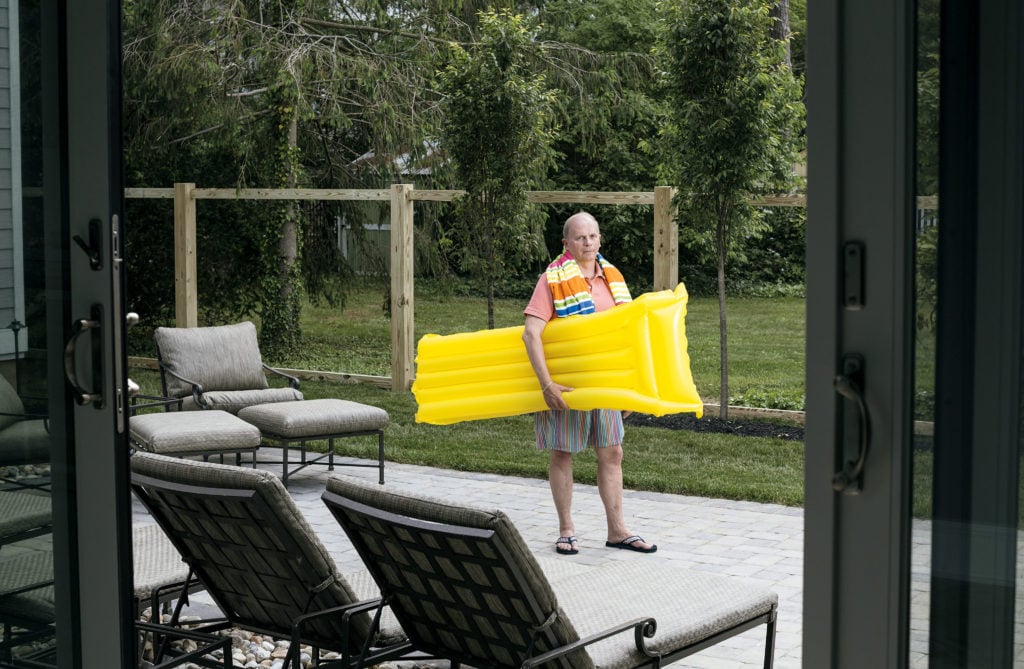
When the group brought the issue to the city, Mayor Sam Cooper took it up enthusiastically, declaring a moratorium on new pool construction. He and the commissioners were promptly sued by Rick Perry, a banking lawyer in Washington whose experience dates to the Carter administration and who was planning a pool for his new seven-bedroom rental. “They are infringing on people’s property rights,” Perry says, and lowering his potential rental rates by, he guesses, $2,000 to $3,000 a week in-season.
That’s when the mayor embraced the idea of the pool lockdown.
Word got out about the idea around Memorial Day last year, the first time a mass of visitors ran into a batch of new laws enacted in the off-season, one of which involved noise. rehoboth police say crackdown not aimed at gays, read a headline in the Washington Blade after a nuisance call about Poodle Beach, as the gay section of the beach is known, led to police sweeping the whole beach, emptying bottles and checking bags. Zealous locals, Perry says, were “literally driving around in their car” looking for violations. A group of renters grilling poolside on New Castle Street received multiple visits from the police due to noise. “You’re renting a house during Memorial Day—you’d think you could have a barbecue and have people over,” one of them, a DC resident, says.
Still, plenty of places have noise ordinances, even if not all have the same zealous private-citizen enforcement. A rule prohibiting the use of pools that have already been dug and are already full of water? That’s quite another thing.
Says Kelley Gillespie: “My first thought was: Are you kidding?”
• • •
Sam Cooper has been mayor since 1990, a nine-term incumbent.

“I have a vision of Rehoboth,” he says. “If you’re outside of that, then we’re going to have issues.”
When I met him earlier this year, he was by turns affable and vulnerable, resolute about matters of his town’s identity and somewhat rambling about the politics of its bogeyman neighbor 120 miles inland. Our conversation also took some weird turns.
“I grew up in a time when we had segregated schools,” he said. “I don’t think my folks were racist, but they obviously had—we used the N-word and all that, so I’ve had to adapt to that.” Taking kids from “very poor homes, single-parent homes” and mandating that “XYZ is taught to preschoolers—well, you can blow it into something like Nazi Germany, where you’re indoctrinating . . . .” He trailed off, crumpling his lips into a frown.
Part of a generations-old Rehoboth family, the mayor lives in the house his grandfather built. Growing up at the shore, he says, “was like a Norman Rockwell painting. Everybody knew everybody. People looked out for each other.” Cooper stepped into local politics in 1965 alongside his mother as she waged a successful fight against developers trying to build high-rises. His anti-development stance has been a key factor in winning reelection for the last quarter century.
If you’re on his side, he’s Rehoboth’s heart and soul, its loyal protector. “If somebody could just take all his knowledge and bottle it, we’d be set,” says Susan Gay, a local activist.
Cooper’s supporters point out that he’s no anti-growth puritan: He has led Rehoboth as it transformed into a year-round destination, with numerous festivals and two James Beard–recognized chefs. He has overseen downtown refurbishment projects and promoted a booster group that drove tourism.
Cooper’s foes, meanwhile, say he can sometimes operate, as local builder Allen Walker puts it, “like a dictator.”
Businessman Tom McGlone ran against Cooper in a 2014 campaign that devolved into shouting matches and an anonymous letter sent to voters days before the election claiming McGlone was planning to turn Rehoboth into a new Dewey Beach, one of the nastiest smears you could make (after the slightly more overdeveloped Ocean City). Following the election, McGlone says, the mayor blocked him from committees, and the only volunteer work he could find was founding a dog park in Lewes.
Cooper archnemesis Gene Lawson, a former partner in the Strand dance hall, was so enraged after that club shuttered 20 years ago that he went to law school. Now an attorney who splits his time between McLean and Rehoboth, Lawson has ended up in court ten times with the city over property-rights issues—all while literally facing off against the mayor: Their back yards run smack into each other.
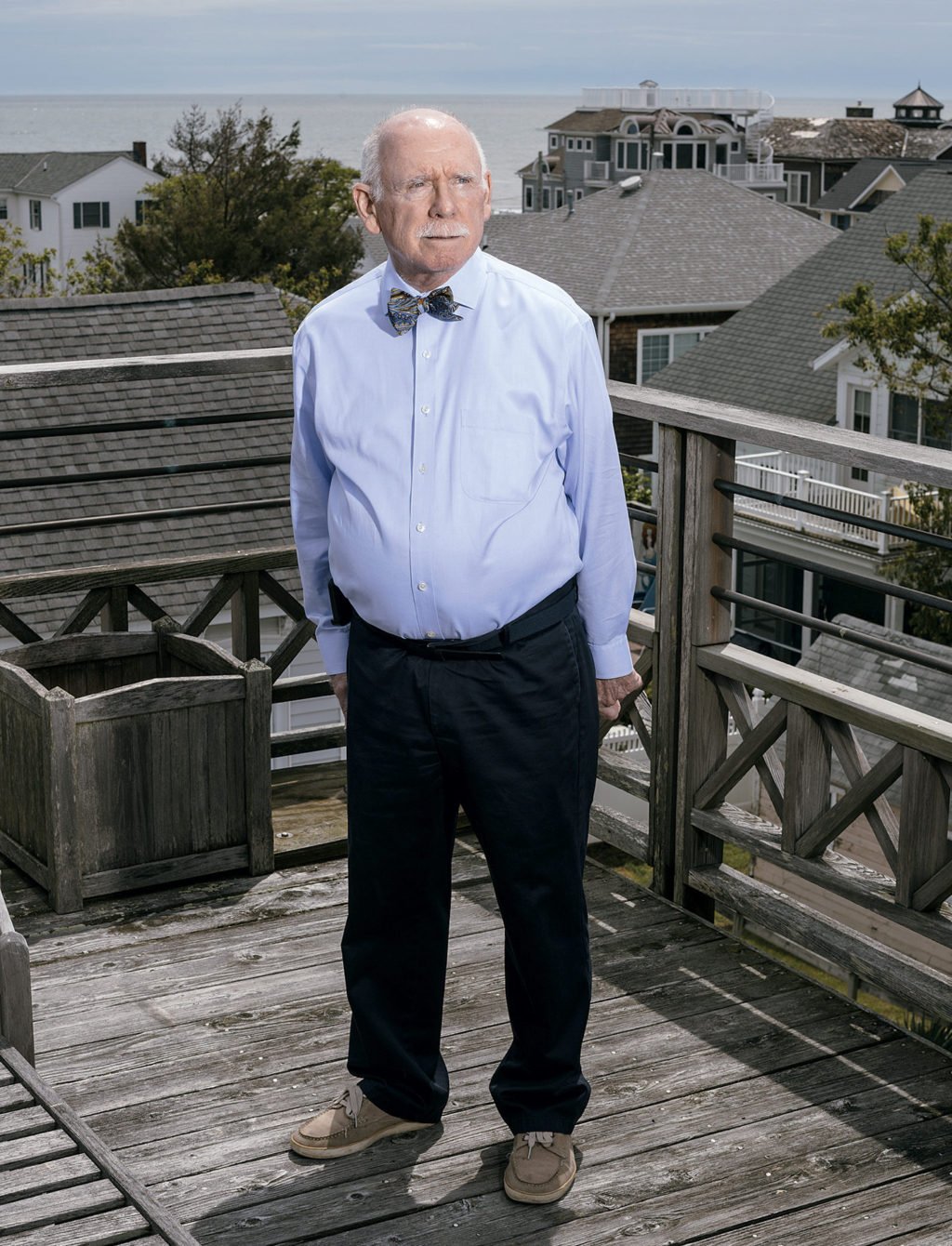
Part of Lawson’s beef is that Cooper has benefited from Rehoboth’s own tourist development. “He’s never worked a day in his life,” Lawson scoffs. Cooper’s income, in addition to his mayoral salary of $1,000 a year, comes from the longtime family business: tourist-driven real estate. His inherited properties in Rehoboth, including several homes and apartments he rents, plus a hotel co-owned with a cousin, Delaware state treas-urer Ken Simpler, are assessed at nearly $20 million, making Cooper’s family one of the town’s largest landowners.
For the mayor, there’s no paradox. If you’re local, you’re not a threat. In describing his ideal future for the town, Cooper invokes one in which vacationers provide an economy for the year-rounders—but don’t chase others away, particularly families with kids.
Although the value of his own properties has risen considerably over the years, Cooper says it’s worth more to him that Rehoboth remain a cozy community. “You get someone from DC who’s on the second block of Norfolk, say. A lot of pine trees. Buys an old cottage. Tears it down. Cuts all the trees down. And builds their house,” he says, his voice beginning to rise. “Then they have their friends down, or they rent it, and they say, ‘Look what a wonderful neighborhood I live in. Isn’t this great?’ But they don’t have any trees! They don’t have the little cottages that make it quaint!
“It’s taking advantage of something but not being a part of it, if you will.”
• • •
Gillespie and her husband, who live in Tysons most of the year, bought their Rehoboth house in 2013 and have rented it out some.
The pool helped attract vacationers and increased the amount they were able to ask by 15 to 20 percent, besides adding to the home’s long-term value. There was no way they weren’t going to mobilize to protect it.
A seasoned operative who has planned events for 350,000 on the Mall, she linked arms with the people who became Save Our Nation’s Summer Capital—the group’s name representing a play on Save Our City, a longtime anti-development PAC in Rehoboth.
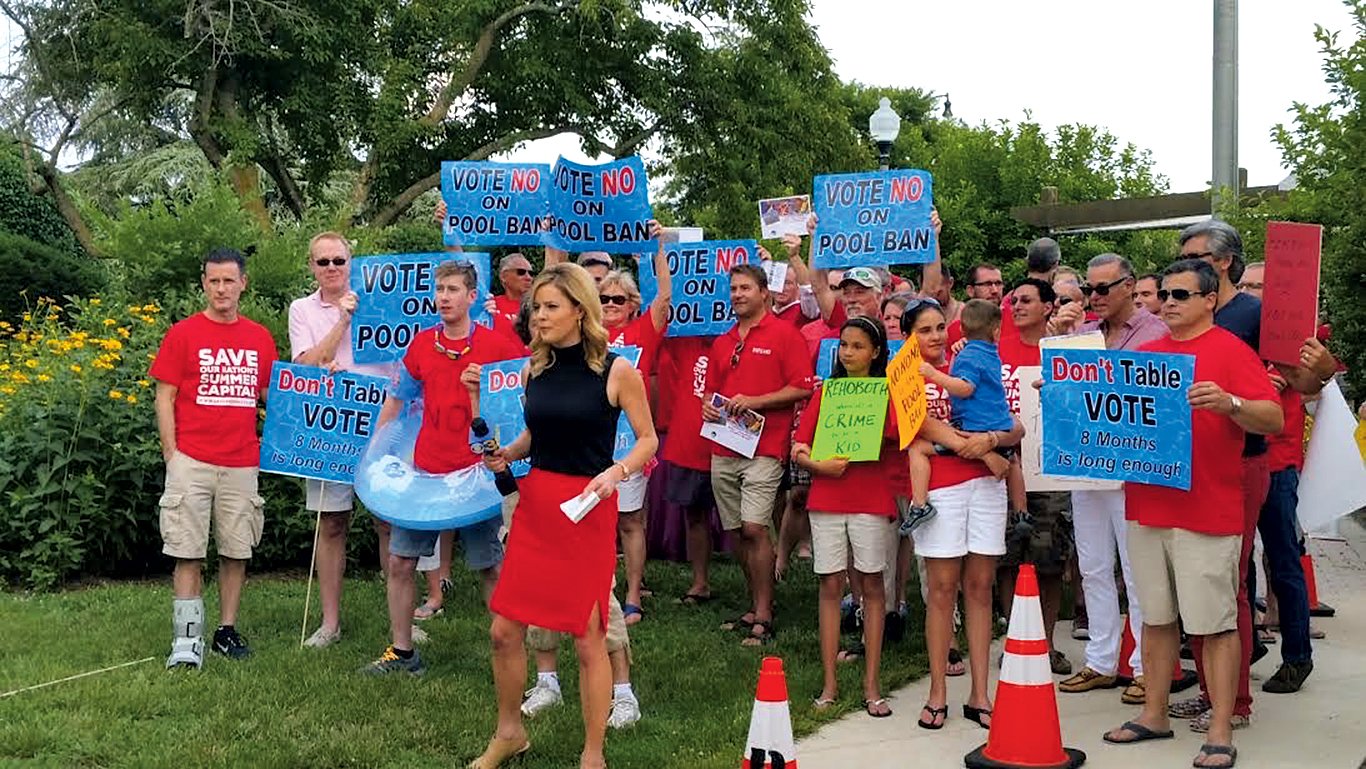
With only weeks before the vote on the pool lockdown, Save Our Nation’s Summer Capital launched a social-media campaign around what they considered absurd-sounding noise complaints—say, the time someone called the cops about a family swimming in the middle of the day. The talking points on their fliers circulated an anti-nanny-state message: “Unamerican. Unconstitutional. Unbelievable!”
After Gillespie posted that picture of her kids—the one in which they were holding the “REHOBOTH where it’s a CRIME to be a KID” photo—it went viral.
The Cooper administration and its allies were unprepared for the onslaught.
“Gimmicks,” they lobbed back.
“Stunts for the media.”
“The worst of Washington.”
Or, as the mayor put it, “the DC mentality.”
Gillespie’s outfit did feature some well-connected members, including former Democratic House whip Tony Coelho. Naturally, conspiracy theories abounded. About the influence of dark money from deep-pocketed Washingtonians. About alleged schemes to bus pro-pool people to the vote. About “Swift-Boat Realtors” funding attacks on anti-pool locals and out-of-towners who “see Rehoboth Beach as the maraschino cherry and whipped cream on the manure-filled crepe they have already made of Sussex County and Route 1.”
But by the day of the vote, the swimming ban had been out-messaged. The lockdown measure failed unanimously. Even Mayor Cooper—taken aback by the vehemence of his opponents—voted against it.
Instead of smoothing over hard feelings, the vote only sparked a number of other conflagrations, including litigation over the town’s six-month residency requirement for voting—one of the longest in Delaware and a hurdle to newcomers motivated to take part in local politics. The requirement didn’t stop Perry, whose pool lawsuit had by now entered an endless appeals process, from launching his own campaign to join the board of commissioners. Candidates on both sides saw their campaign signs illegally removed from yards. One night after a forum, Perry says, the taillight of his black Range Rover was smashed as it sat in his driveway.
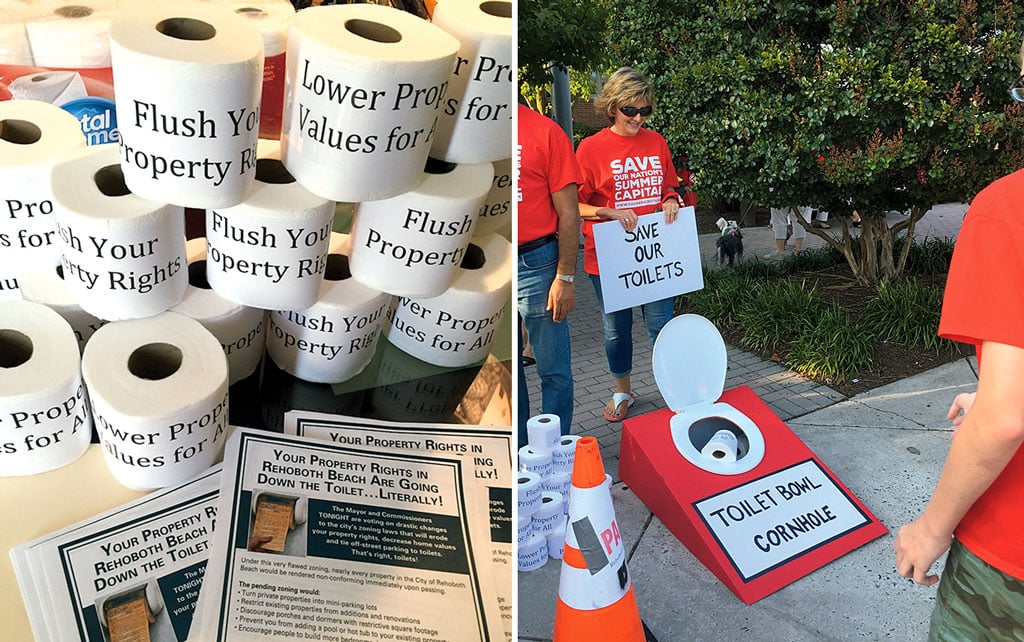
Meanwhile, Save Our Nation’s Summer Capital had moved on to protesting a zoning ordinance meant to curb the mini-hotel problem. The legislation had a section that linked a new house’s parking spaces to its number of toilets—so of course, SONSC made up toilet-paper rolls emblazoned with flush your property rights and signs reading save our toilets and staged a public game of toilet-bowl cornhole outside City Hall while TV cameras rolled.
Again, gimmicks. Again, they worked. The commissioners passed the ordinance 6–1 but dropped the bit about toilets.
• • •
By the time the season ended, Coelho, the former congressman turned consultant, had come to think town politics had become more dysfunctional than on Capitol Hill—and more personally corrosive.
“What they’ve done is they’ve split the community, and this is a community where people have to live,” he says. “In Congress, people do whatever they do, but they go back home.”
Booing and shouting each other down in public. Bad-mouthing each other in the Cape Gazette. Online trolling. It’s hard to go home from all of that when your house is blocks away from the opposition.
Today, Sam Cooper isn’t sure he’ll run for a tenth term in 2017. He wonders if he’ll be locked in the same development fights over and over again forever. He says he reads obituaries and wonders whether he’s really spending his time in the best way: “You begin to think your whole life’s not in front of you anymore, and you have to grapple with that.”
After such a momentous 2015, you might expect to look around Rehoboth and see a different place. In fact, the opposite is true. This spring, the pace of construction was still intense. On just about every block, it seemed, a large boxy new house stood out, wrapped in Tyvek like a present that none of its neighbors want.
“The city’s changing,” planning-committee member Francis “Bunky” Markert says. “As much as we love the old charming little beach houses—with the exception of probably a rare few, they’re all going to get torn down, they’re all going to get rebuilt.”

During the time I was there, workmen were repairing broken awnings and shutters in preparation for this season, and a full-scale replenishment of beach sand was under way to fix storm damage from the past two winters. Neighborly fence-mending seemed much less likely, though. Perry, who lost his election, created a brand-new group, One Rehoboth Moving Forward Together, meant to draw members from both sides of the divide and to be a “catalyst.” But he couldn’t get anyone from the other side to join.
Then, weeks before the beginning of this summer’s season, I got an e-mail from Kelley Gillespie with the subject line “New Trash Law in Rehoboth Beach.”
The city recently set trash pickup for Tuesdays, she explained, and announced a fine for those who don’t comply. It means that people who are there mostly on weekends will have trouble getting their receptacles on the street or bringing them back in and are likely to be smacked with fines. On the local message board, there were already 70 comments on the trash-policy post.
Gillespie knew what she’d do. Her e-mail ended: “I’m looking at another push back soon!”
Contributing editor Britt Peterson (brittpeterson2@gmail.com) also writes for Foreign Policy and Elle. On Twitter, she’s @brittkpeterson.
This article appears in our July 2016 issue of Washingtonian.

